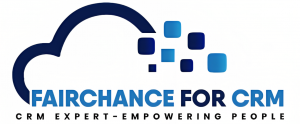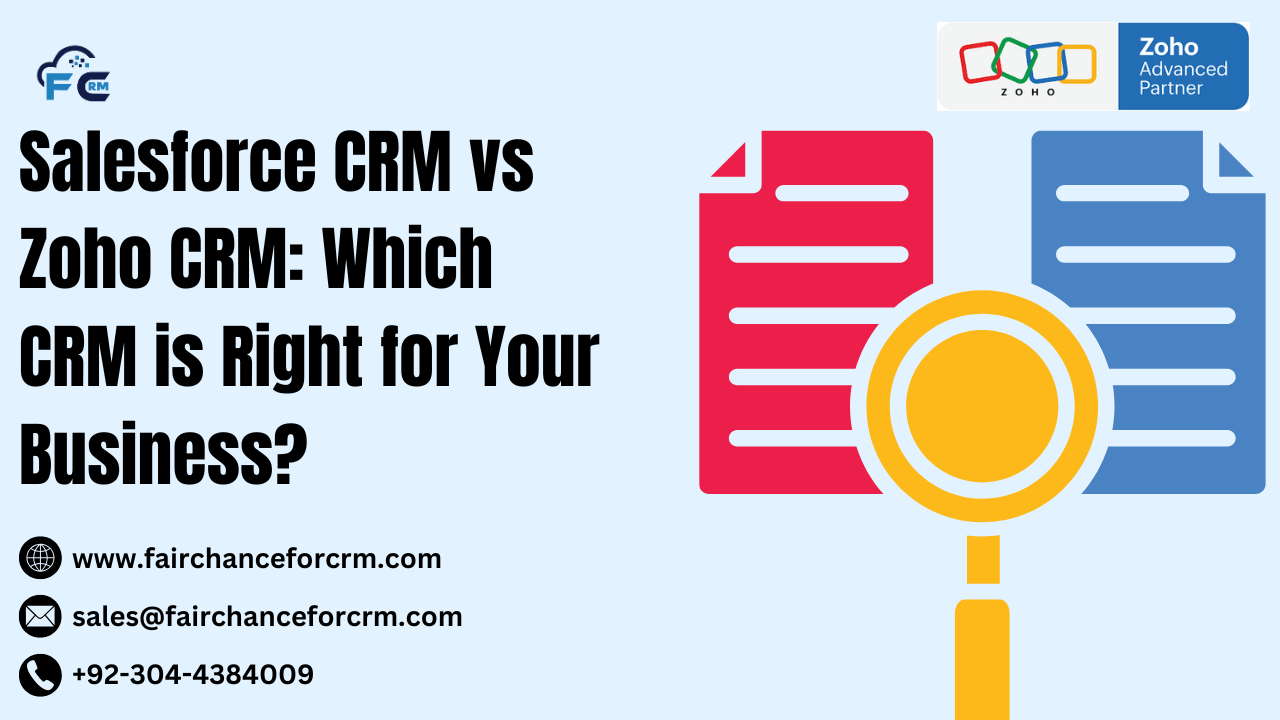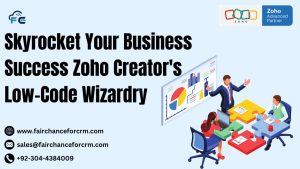Salesforce CRM vs Zoho CRM is today our topic, in which we cover all the points related to both CRMs. When it comes to choosing the right CRM (Customer Relationship Management) platform for your business, the decision can often be overwhelming. Two of the most widely used CRM solutions are Salesforce CRM and Zoho CRM. Both are jam-packed with features to boost productivity, enhance client interactions, and expedite sales procedures.]
In this comprehensive comparison, we will dive deep into Salesforce CRM vs Zoho CRM, evaluating their strengths, weaknesses, pricing, features, and customer support.
Also Read:
- How to Configure SSL for Odoo? A Complete Guide
- Dockerfile Odoo: A Comprehensive Guide with Coding Examples
- How to Download Odoo Enterprise Source Code: A Step-by-Step Guide
- Odoo Serial Number Tracking: Enhancing Inventory Management and Product Traceability
- How to Deactivate Zoho Account: FAIRCHANCE FOR CRM
Salesforce CRM vs Zoho CRM – Select You Best CRM
Salesforce CRM: Overview
Salesforce is a cloud-based CRM that has dominated the market for over two decades. Large corporations and companies that need a high level of flexibility and potent AI-driven insights frequently employ it because of its strong features, scalability, and sophisticated automation tools.
Benefits of Salesforce CRM:
- Comprehensive Features: Salesforce offers a wide range of features including sales automation, marketing automation, analytics, customer support, and advanced forecasting.
- Highly Customizable: Businesses can modify Salesforce to meet specific needs by customizing workflows, fields, and processes.
- Scalability: Ideal for large organizations and enterprises.
- AI and Automation: Salesforce integrates Salesforce Einstein for advanced AI capabilities to predict customer behavior and automate tasks.
- Third-Party Integrations: Salesforce offers access to the AppExchange marketplace, providing thousands of third-party apps to integrate with other tools.
Drawbacks of Salesforce CRM:
- Expensive: Salesforce is known for its high pricing, especially for small businesses.
- Complexity: The large number of features can make the platform difficult to navigate, especially for non-technical users.
- Long Implementation Time: Salesforce often requires a lengthy setup and configuration period, which can take weeks or even months to complete.
Zoho CRM: Overview
A complete cloud-based CRM program, Zoho CRM helps small and medium-sized organizations improve their client relationships. It offers robust customization options for lead, sales, marketing, and customer support management, along with a very user-friendly interface and streamlined functionality.
Benefits of Zoho CRM:
- Ease of Use: Zoho CRM is user-friendly and doesn’t require a steep learning curve. Businesses can start using it right away with minimal training.
- Affordable: Small and medium-sized organizations who require an all-in-one CRM will find Zoho CRM to be the perfect choice due to its low cost.
- Customization: Zoho CRM offers robust customization features that allow businesses to tailor the platform to their unique processes. From creating custom fields to setting up workflows, Zoho gives businesses flexibility.
- Seamless Integrations: With integrations to Google Workspace, Mailchimp, Slack, and other third-party applications, Zoho CRM ensures that businesses can work with the tools they already use.
- AI and Automation: Zoho CRM includes Zia, an AI-powered assistant that helps predict trends, automate repetitive tasks, and provide insights into sales performance.
- Mobile-Friendly: Zoho CRM offers a highly rated mobile app that lets users manage sales, track activities, and communicate with customers on the go.
Drawbacks of Zoho CRM:
- Limited Advanced Features: While Zoho CRM is feature-rich, it may lack some of the enterprise-level tools available in Salesforce, such as advanced analytics and deep AI capabilities.
- Support: Although Zoho CRM provides good customer support, larger businesses may find its support less comprehensive compared to Salesforce’s enterprise-grade offerings.
Salesforce CRM vs Zoho CRM: Pricing Comparison
Salesforce CRM Pricing
Salesforce uses a tiered pricing model, with four main plans designed to cater to different business needs. Pricing is based on the number of users and the specific features required.
| Plan | Pricing | Features |
|---|---|---|
| Essentials | $25 per user/month | Basic CRM features for small businesses. |
| Professional | $75 per user/month | Includes sales automation, reporting, and collaboration. |
| Enterprise | $150 per user/month | Advanced CRM features, custom app creation, and more. |
| Unlimited | $300 per user/month | Full access to all features, 24/7 support, and customization. |
Note: Salesforce also offers additional costs for integrations, data storage, and customization. It’s one of the most expensive CRMs on the market, making it ideal for large enterprises but less suited for smaller businesses on a budget.
Zoho CRM Pricing
Zoho CRM offers a more affordable pricing structure that is suitable for small and medium-sized businesses. Their pricing is flexible, offering options for companies just getting started or those looking for advanced features.
| Plan | Pricing | Features |
|---|---|---|
| Free Plan | Free for up to 3 users | Basic CRM features like contact management and sales pipeline. |
| Standard | $14 per user/month | Basic sales automation, email integration, and reporting. |
| Professional | $23 per user/month | Includes advanced reporting, workflow automation, and sales forecasting. |
| Enterprise | $40 per user/month | Advanced customization, AI-powered assistant, and deeper analytics. |
| Ultimate | $52 per user/month | Full-feature access, data encryption, and advanced reporting. |
Note: Zoho CRM is significantly more affordable than Salesforce, making it ideal for smaller businesses or businesses that need a cost-effective solution without sacrificing essential CRM features.
Key Differences Between Salesforce CRM vs Zoho CRM
1. Ease of Use
- Salesforce: Can be overwhelming, especially for smaller teams or businesses new to CRMs. It requires more training to master.
- Zoho: Known for its user-friendly interface and ease of use. Businesses can quickly implement and start using Zoho CRM with little to no technical experience.
2. Customization
- Salesforce: Offers highly customizable workflows, dashboards, and features. However, customization often requires developer expertise and can incur additional costs.
- Zoho: Offers solid customization options but with a simpler interface.
3. Features
- Salesforce: Extremely feature-rich with AI-driven analytics, deep integrations, and a wide array of advanced tools suited for large businesses.
- Zoho: While not as feature-heavy as Salesforce, Zoho CRM offers everything small to medium-sized businesses need in terms of automation, reporting, and integrations.
4. Scalability
- Salesforce: Highly scalable, making it ideal for large enterprises and companies that are rapidly expanding.
- Zoho: Scalable for small to medium-sized businesses but may not be suitable for enterprises with complex needs or millions of users.
5. Pricing
- Salesforce: Expensive, with plans starting at per user/month and quickly rising for more advanced features.
- Zoho: Much more affordable, with a free plan for up to 3 users and paid plans starting at just per user/month.
6. Customer Support
- Salesforce: Excellent support, including 24/7 access to experts, a robust community, and training resources.
- Zoho: Good support, though some users report slower response times compared to Salesforce. However, Zoho’s support is still very responsive, especially for small businesses.
Which CRM is Right for Your Business?
Both Salesforce CRM vs Zoho CRM provide strong customer relationship management solutions; however, the one you choose will mostly rely on your company’s size, financial constraints, and particular CRM requirements.
- Choose Salesforce CRM if you are a large enterprise or business with complex needs, a large sales team, and a significant budget. Salesforce’s advanced automation, AI capabilities, and scalability make it an ideal choice for organizations that need a high degree of customization and deep analytics.
- Choose Zoho CRM if you are a small to medium-sized business looking for an affordable, user-friendly CRM solution with powerful features. Zoho CRM provides everything you need to manage your sales pipeline, automate processes, and nurture customer relationships without the high cost and complexity of Salesforce.
For more information about the Salesforce CRM vs Zoho CRM: visit this link.
If you want to Free Trail Zoho, click on this link.




